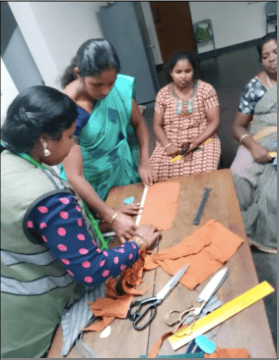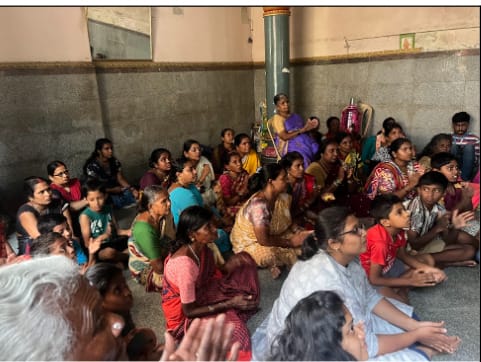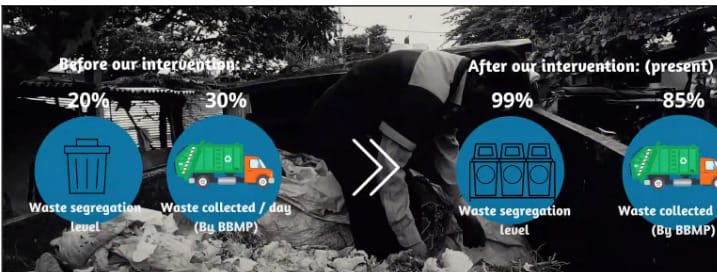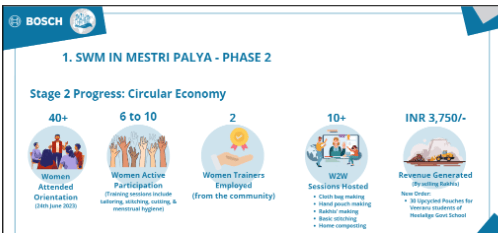Part 1 of this series traced the journey of raising awareness about waste management and facilitating behavioural change in phase 1 of #TeamLBTC’s (Let’s Be The Change) efforts in Mestri Palya. In part 2, we look at the process behind empowering the community members to create products out of waste as well as what more can be done to replicate the same model of waste management in other slums in the city.
Waste to wealth initiative
Soon after the successful implementation of Phase 1 of the project, we gradually moved into Phase 2. Before the initiation of Phase 2, an orientation session was conducted in the community. The idea was to explain how waste could be utilised and converted into wealth.
We rarely think of waste as being useful, but this whole new area of thought was opened to them. During this initiative, we showcased products such as handbags, pouches, tote bags, etc. that could be made from textile waste or coconut shells. More than 50 people joined the meeting, and some chose to participate weekly. We continue to conduct these sessions with interested individuals, hoping to scale it up gradually.
Read more: Bettahalasur village, north of Bengaluru, no longer has a garbage crisis. Here’s how
We have named this the ‘Waste to Wealth’ initiative where we can incentivise the community members to work on the creation of market products from the waste generated at home. This concept can have a wide-reaching impact not only in terms of waste management, but also skill development and economic upliftment of the community. It has been a challenge to involve men in our initiative till now, especially in the “ Waste to Wealth Initiative”, but we aim to make the training sessions open to all.
Men failed to attend the sessions due to odd work timings, lack of interest mostly because they did not think they could make enough money out of this to sustain their families, and gender stereotypes concerning the ‘nature’ of jobs like stitching. Currently, most women involved are housewives, and a few are working ones. As part of our plans, we hope to incorporate everyone in our training sessions irrespective of their gender.
Implementation & limitations
To implement this project on a larger scale and cover more slums, the availability of human resources is a major concern. It has been a very gradual process where rapport building was a key criterion. To increase the impact, we would need many more field volunteers and assistance from like-minded NGOs. Bridging the gap between the government and the community has been our motive and to achieve this, the idea needs to be spread.
Solving the problem requires many stakeholders, involving government authorities, waste collection vehicles, and marshals. Therefore, taking into account multiple aspects of the same problem will be important. The solutions needed will be specific, which will require substantial participation from diverse authorities and NGOs .
Our team would not deny the replicability of this model, but for that, certain factors need to be kept in mind. An initial study about the neighbourhood needs to be conducted before we can move ahead with a slightly tweaked and personalised plan.
As of now, we have completed phase 1 of our project in Mestri Palya, where community members are clear about best waste disposal practices. There is 100% waste segregation at source and waste collection. Most importantly, we have been able to help the citizens identify their rights to empower them to make efficient decisions concerning their difficulties. We are currently working on improving phase 2 of the project.
For Phase 2, we are currently trying to upcycle textile waste and in the process train women of the community to make products, like pouches, rakhis, etc., that can thrive in the market. Weekly sessions are held where the women are trained to use sewing machines. During the festival of Rakhi, these women made rakhis, which we helped sell in the market. The revenue earned out of it was Rs. 30,000 and we consider it a huge success in terms of empowerment and a step towards economic stability of the women in the community.
Read more: Unused materials in your home can help B’luru kids get back to school: An eco-group shows how

Residents of Mestri Palya has come a long way from where it started and we, along with them, have evolved. As we plan, we would like to make the ‘Waste to Wealth’ initiative a success trying to involve both men and women in the process. We are currently working on increasing the number of participants in the sessions and planning to take their handmade products to the markets.




Great initiative….Hope this gets emulated to other areas of Bengaluru